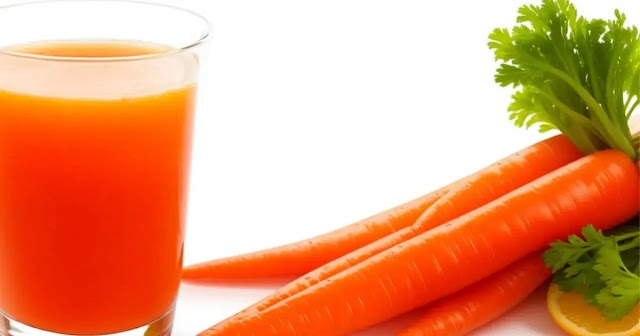Carrot juice has been celebrated for its numerous health benefits. Packed with essential nutrients, it can absolutely be a valuable addition to your diet. However, just like with any other food, moderation is key. In this inclusive article, we will explore the potential side effects of carrot juice, the appropriate consumption levels and how to incorporate it safely into your diet.
Side Effects of Carrot Juice
Carrot
juice, celebrated for its array of health benefits, has secured a place as a
beloved addition to the diets of many health conscious individuals. Brimming
with essential nutrients, it certainly offers a nourishing boost to overall health.
However, just like any other food, there's a flip side to this seemingly
magical elixir. But carrot juice and shed light on the potential side effects
that demand our attention. So, let's embark on this enlightening journey to
unveil the truth behind the side effects of carrot juice you should know.
Goodness of Carrot Juice
Before
diving into the potential side effects, it is crucial to highlight the plethora
of benefits which carrot juice offers. Rich in vitamins A, B, C, D, E, and K. It
is also has minerals like potassium, calcium and magnesium. It promotes healthy
vision, boosts the immune system, aids digestion and enhances skin health. The
high antioxidant content of carrots also contributes to fighting free radicals
in the body.
Excessive Vitamin A Intake
While
vitamin A is necessary for maintaining healthy skin, vision and a robust immune
system, overconsumption can lead to adverse effects. Carrots are incredibly
rich in beta carotene, a compound which converts to vitamin A in the body.
Consume an excessive quantity of carrot juice, mostly when combined with other
vitamin A-rich foods. Symptoms of this circumstance include faintness, nausea,
blurred vision and even hair loss.
Blood Sugar Concerns
For
individuals with diabetes or those struggling to maintain stable blood sugar
levels, carrot juice should be consumed with caution. Carrots themselves have a
relatively high glycemic index. This sudden influx of sugars can cause a sharp
spike in blood sugar levels. If you have diabetes or any blood sugar related
issues, it is advisable to consult with your healthcare provider before
incorporating carrot juice into your diet.
Stomach Distress
Carrot
juice, when consumed in great quantities may cause gastrointestinal uneasiness
in some individuals. The high fiber content of carrots can lead to swelling gas
and stomach cramps. To avoid these issues, twitch with small quantities of
carrot juice and slowly increase the quantity over time.
Allergic Reactions
Although
rare, some individuals may experience allergic reactions to carrots or carrot
juice. Indications of carrot allergies may include itching, hives, swelling. If
you suspect you have an allergy to carrots, it is crucial to seek immediate
medical attention.
Interactions with Medications
Carrot
juice contains compounds that might interact with certain medications. For example,
the high levels of vitamin K in carrots could interfere with blood thinning
medications. If you are on any prescription drugs, consult with your healthcare
provider before adding carrot juice to your daily routine.
Discoloration of Skin
Consuming
large quantities of carrot juice for prolonged periods can lead to a harmless
but noticeable change in skin color. This condition, known as carotenemia,
occurs due to the accumulation of beta carotene in the bloodstream, causing the
skin to turn slightly yellow or orange. This condition is entirely harmless and
reversible once carrot consumption is reduced.
Not Suitable for Infants
Infants younger than six months should not be given carrot juice. Their digestive systems are not fully developed to handle the concentrated nutrients and sugars present in the juice. Introducing carrot juice to infants too early may increase the risk of allergies.
Kidney Stone Risk
Individuals with a history of kidney stones or those prone to developing them should exercise caution with carrot juice consumption. Carrots contain oxalates, which can contribute to the formation of kidney stones when consumed in excessive amounts.
Too Much Carrot Juice Side Effects
Drinking
excessive carrot juice can lead to certain side effects. Carrots are naturally
high in beta-carotene, a compound which gets converted into vitamin A in the
body. While vitamin A is essential for good vision, immune function but consuming
too much beta-carotene can cause a condition called carotenemia. This condition
results in the skin turning yellow or orange. Though it is harmless, it might
be mistaken for jaundice.
Carrot Poisoning Symptoms
Drinking
excessive carrot juice can lead to certain side effects. Carrots has vitamin A
is essential for good vision and healthy skin, consuming too much beta-carotene
can cause a condition. This condition results in the skin turning orange,
especially on the palms and soles of the feet. Though it is harmless, it might
be mistaken for jaundice.
Side Effects of eating too Many Carrots
Eating
too many carrots can lead to certain side effects due to their high
beta-carotene content. A pigment responsible for the vibrant orange color of carrots
is converted into vitamin A in the body. While vitamin A is essential for
various bodily functions, excessive intake can cause a condition. Moreover,
consuming large quantities of carrots regularly may also disrupt the body's
natural balance of nutrients and potentially lead to digestive issues like
bloating and diarrhea.
Conclusion
While carrot juice is undeniably a nutrient-rich and beneficial beverage, it should be consumed in moderation. Too much of a good thing can lead to unwanted side effects, so ensure a balanced and varied diet.
Is ginger a fruit or vegetable
How Much Carrot Juice is Safe to Drink Daily


.webp)


0 Comments